
Romney just one of the boys in class of ’65
Prep school friends recall a prankster, not a bully
5/20/2012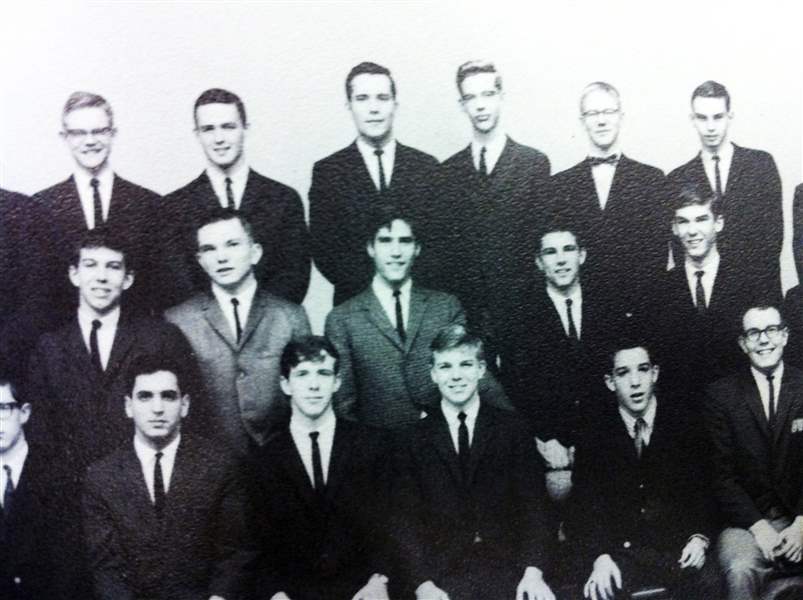
Mitt Romney, center, participated in the glee club during his years at Cranbrook. He also ran cross country, pushing himself hard, one classmate recalls.
Cranbrook Schools
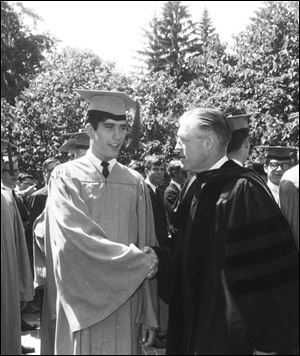
Mitt Romney and his father, Michigan Gov. George Romney, celebrate Mitt’s graduation in June, 1965.
BLOOMFIELD HILLS, Mich. — Teasing, cutting jokes, and pranks were part of the culture of the exclusive private Cranbrook School for boys north of Detroit when Mitt Romney was there in the 1960s.
So were high academic demands, athletics, and a certain naive camaraderie, say members of the class of 1965 who were interviewed by The Blade.
Young Romney, the current presumptive Republican candidate for president, was part of it all.
The men who went though the school with Mr. Romney recalled him not as the most outstanding member of the class, rather just as one of the boys.
A recent Washington Post report documented an incident in which Mr. Romney, as a senior, led a group of other young men in pinning down a younger student in a dorm room and cutting off a shock of his newly bleached blond hair that hung in his face.
Fellow students reached by The Blade said they never heard of the incident and were convinced it happened only because they trust their four classmates who attested to it on the record.
That is essentially the same assessment drawn by Ben Snyder, who was the school's assistant headmaster in 1965. Now retired in Falmouth, Maine, Mr. Snyder said he was unaware of the incident but said he considers students who reported the bullying episode to be trustworthy. "I knew three of the four quite well and they were some of the best kids we had in those days," Mr. Snyder said.
If any Cranbrook faculty would have known about it, it would have been Mr. Snyder, who was chairman of the discipline committee in 1965.
"Given the nature of discipline at the school at the time, it could have brought either suspension or dismissal. It would not have been taken lightly," Mr. Snyder said.
He said the discipline problems in Mr. Romney's class, which had between 65 and 70 students, usually involved drinking and smoking.

Mitt Romney, center, participated in the glee club during his years at Cranbrook. He also ran cross country, pushing himself hard, one classmate recalls.
If an infraction was reported, a hearing would be held, with resident students represented by a housemaster and day students by a teacher.
"They would be given every right to represent their position and after we finished the discussion, we would decide what the punishment would be and hand it up to the head of the school, who had the right to accept it or modify it," Mr. Snyder said
Mr. Snyder, who served at Cranbrook from 1948-1990, said the term bullying "had not become fashionable" in the 1960s, but any time a problem arose "you would take the culprit to task, and they would realize they had done the wrong thing and had to pay a price."
Robert Sandoe, Cranbrook's headmaster from 1965-72, said he was never informed of any bullying incident involving Mr. Romney. Interviewed at his home in Fort Myers, Fla., Mr. Sandoe, 87, said the school did not have a policy on bullying while he was there.
"Nobody was even thinking about it. There was no bullying and no bullying policy," he said. "One of the nice things about Cranbrook is the kids are nice."
His wife, Frederica Sandoe, described it as "a very orderly school. Everybody wore coats and ties and behaved themselves. Cranbrook was a conventional school founded by someone who wanted a school in the English manner."
She said Mr. Romney was "a well-liked kid, academically good, athletically good. Everybody liked him. We knew his parents very well. And no, we're not Republicans, so that's not why we're saying it."
Mr. Romney has said he doesn't remember the reported incident but told Fox News Radio that "back in high school, I did some dumb things, and if anybody was hurt by that or offended, obviously I apologize."
Mr. Romney switched from day student to boarder when his father, George Romney, became governor of the state. Mitt Romney was involved in social, academic, religious, and athletic activities. He also had a reputation for pranking.
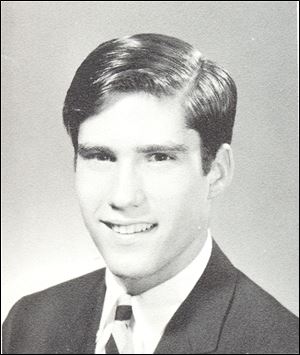
Mitt Romney, now the presumptive Republican candidate for president, is shown in his senior year at Cranbrook in 1965.
One student recalled that he and Mr. Romney raised money one time by buying the beat-up old car of the art teacher for $50 and then selling fellow students the right to take three swings at the car with a club for a dollar.
"When I saw the [bullying] story I was surprised by it," said '65 classmate Bill Schlecte, now a lawyer in Ann Arbor and a supporter of President Obama. "I would never have considered Mitt Romney a bully."
‘A moral thread'
Classmate Mark Mayerstein, a Baptist minister in Albuquerque, N.M., saw another side of Mr. Romney. He said Mr. Romney had a moralistic streak.
Mr. Mayerstein said he was one of a handful of Jewish students at Cranbrook. Years later, he converted to Christianity.
He said he and two other Jewish boys were the target of an anti-Semitic joke by a group of boys who approached them in a dormitory hallway.
He said Mr. Romney had come up behind them and didn't like what he heard.
"He told the three they ought to be ashamed and that they should apologize. When they kept walking and didn't apologize, Mitt apologized to us for them," said Mr. Mayerstein.
"High school kids just don't have the filters that adults have. Mitt seemed to have that one filter that none of us possessed. It was this moral thread. He was the voice of reason sometimes. He would say, ‘Do you really want to do that?'" Mr. Mayerstein said.
But he was unable to explain Mr. Romney's reported participation in the incident with John Lauber, who was perceived as homosexual, and indeed came out as gay years later. Mr. Lauber died of cancer in 2004.
The incident came to light about the same time that Mr. Romney's Democratic opponent, President Obama, announced that he personally supports the right of people of the same sex to marry, a reversal of his stance in 2008 when he said he viewed marriage as only being possible between a man and a woman.
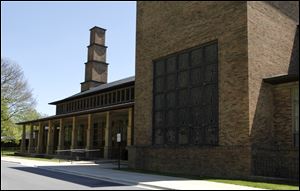
The 319-acre Cranbrook campus on Woodward Avenue north of Detroit is renowned for its architecture.
Like Mr. Mayerstein, former headmaster Sandoe also saw a moral streak in Mr. Romney when he was a student at Cranbrook — enough to raise doubts in his mind about the truth of the bullying report.
"He was a nice kid and if there were a bullying incident in the traditional sense and he came along and saw it, I rather suspect he would break it up," Mr. Sandoe said. "I have to say I was very surprised when this rumor came out and my suspicion is that it's like the John Kerry incident, the Swift boat story, that it came out afterward that it was just so much hooey."
In that 2004 case, Vietnam veterans made claims in political ads against Mr. Kerry's war record that later proved to be false.
A premier school
Considered one of the premier private schools of the Midwest, Cranbrook was founded in 1922. A companion girls school, Kingswood, where Mitt Romney's wife, Ann Romney, attended, was established in 1931.
Today, Cranbrook still has separate middle schools for boys and girls but coeducational high school classes. The campus, renowned for its architecture, is on a 319-acre estate that sits off Woodward Avenue north of Detroit.
Margot Snyder, wife of Ben Snyder, the former assistant headmaster, said the campus is so beautiful that when she first saw it, "I thought I had been dropped into paradise."
Like Maumee Valley Country Day School in Toledo, it drew a largely affluent clientele because you had to have money to afford the tuition.
Unlike in the 1960s, Cranbrook today has a strict policy against bullying that is taught in every grade starting in preschool, said Clayton Matthews, Cranbrook's director of communications.
"We have students as young as 3 and as old as seniors. There are anti-bullying programs in every grade," he said.
Mr. Matthews said the school could not speak directly to the reported incident involving Mr. Romney. He said the school's current director, Arlyce Seibert, was unavailable for media comment until Monday.
View of bullying
At Maumee Valley Country Day School, the Lauber episode would have been the subject of a serious disciplinary committee investigation if it had come to light, said Gary Boehm, the head of school. He said students found guilty in such an incident would have likely faced suspension and possible expulsion, depending on their record.
"I can't imagine that happening today in our school and probably not in Cranbrook either. That was behavior that was more tolerated back then when there was more of an edge between long-haired kids and jocks, and society was becoming more diverse," Mr. Boehm said.
If it happened today, punishment would be swift.
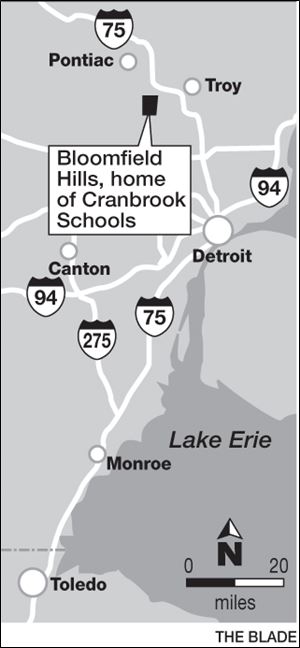
"You cannot physically touch in any unwelcome way another student. You cannot hit or tackle another student. There would be a disciplinary committee hearing," Mr. Boehm said. The meeting would include the head of upper school, dean of students, the students' advisers, and possibly the student council president," Mr. Boehm said.
"I've never worked in a boarding school, and I don't know the boarding school culture well. On the one hand it feels to me like if something bad happens, that somebody feels guilty and eventually it finds its way back to school. Kids go home, they're troubled, somebody talks to a parent, that parent talks to another parent, and it comes back to school," Mr. Boehm said. "On the other hand, I have no doubt kids are doing things that we have no idea what they're doing."
Sam McCoy of Perrysburg, a science teacher at Maumee Valley from 1956 to 1999, said he could not imagine the Lauber incident happening, or staying concealed.
"This would be something in 45 years of teaching I never saw," Mr. McCoy said. "Subtle things go on all the time. They go on with adults. As far as something physical like that, I didn't experience that at Maumee Valley. I never saw kids being bullied. I can't think of any student who ever left Maumee Valley because he was unhappy with his social arrangement there."
That type of event would have resulted in an investigation and discipline, he said.
"There was a lot of camaraderie over the years I was there. There was just a good culture of kids. I never had any trouble with that. Sometimes the faculty beat on each other," he said. "I'm sure out there were kids who were picked on, or somebody called somebody a name, but as far as teaming up on people, no."
Cranbrook students
Graduates of Cranbrook said their classmates were smart, mostly from white, affluent families and competitive with each other in a way that the men insist was healthy and not abusive.
Students had many activities in which to participate, and Mitt Romney was involved widely. Among his activities were playing soccer, managing the junior varsity soccer team and the hockey team, "church cabinet" — a kind of religious club — glee club, cross country, and "The Forum," a public affairs debating club.
Classmate John French said, "I don't remember John Lauber. I don't remember hearing anything about the incident. I don't even remember hearing about that story.
"I'm not saying it's untrue, but it doesn't ring true. And the Post article seemed to hint that it was homophobic. Back in that day, we didn't even know what it was," Mr. French said.
Bill Schlecte said, "When I saw the story I was surprised by it. I would never have considered Mitt Romney a bully.
"I didn't know what a gay was. If it was going on anywhere in Cranbook, I was oblivious. Everybody tried to get along. There might have been some individual animosity. You lived by the bell — everything was so regimented there that you didn't have a lot of time to goof off. I don't recall any instances of taunting or a bullying nature," Mr. Schlecte said.

Mark Mayerstein, who was raised Jewish, recalls Mitt Romney as having stood up for him when he and other Jewish classmates were the target of an anti-Semetic joke.
But as a self-described "nerd," he recalled that he was "picked on" as a freshman by an upperclassman.
He said that while the school population was largely white Protestant, there were Jewish students. Mr. Romney's Mormonism did not create any friction that he could recall. He portrayed an upbringing that was, if anything, protected from harsh realities.
"It was a very good education. … Too rigid an environment, and you didn't have access to the girls except on weekends. You got out of there and you still had a lot of learning to do in life," Mr. Schlecte said.
Mr. Mayerstein, who has not kept up with Mr. Romney, said pranks, such as short-sheeting each other's beds, or soaking someone's pajamas and hanging them out the window on a cold winter night to freeze solid, were common, and said he and Mr. Romney were as guilty as anyone.
"He was enjoyable to be around because he was always scheming. Always the next project. He was always very upbeat. Now there were times when he didn't feel well, when things weren't going right or whatever, when he was a little down," Mr. Mayerstein said. "I always enjoyed being around him. Certainly I participated in pranks. But I don't ever remember anybody that we did anything to [who] got hurt; maybe their feelings got hurt. But high school kids don't think about that."
The jock factor
Mr. Mayerstein remembers Cranbrook as "a very socially structured environment." He said "the jocks actually ran the school," and all of the class officers and prefects — the upperclassman who were elected to supervise the dorms — were jocks.
"If you were not a jock and you crossed one, you would usually get a late-night ‘visit.' At a minimum, nonjocks were not part of the inner circle," Mr. Mayerstein recalled. He said himself was a jock. Mr. Romney was not considered a jock.
Mr. Mayerstein also said "there were kids there who looked down on you if you weren't a WASP [white Anglo-Saxon Protestant]." He said a Chinese student and the one black student at Cranbrook during his time there, as well as himself, as a Jew, "made up for our racial and religious difference by being jocks."
But racial and ethnic slurs were frequent, he said.
"Kids, especially boarding-school kids, do things that sometimes border on pure meanness. Every one of the people in the Washington Post article, and I include myself with this group, did some pretty awful things," said Mr. Mayerstein.
But he was critical of people pointing a finger of shame at those high school shenanigans.
"If a 50-year-old high school prank is more important than the financial or moral state of this country, we are in much worse trouble than anyone has imagined," Mr. Mayerstein said.
Pete "Bird" Werbel, who played soccer at Cranbrook and went on to play soccer at the University of Denver, said he struggled to keep up with some other students in classwork.
"I didn't think there was [bullying] above and beyond what you would see in any normal situation. I pretty much thought you were accepted or rejected for who you were — your personality, your traits, what you contributed in any way, shape, manner, or form that you did," Mr. Werbel said.
He recalled that Mr. Romney, though not an athlete, ran cross country, earning his admiration for pushing himself hard, though he didn't finish the race.
"He ran well enough to be on the varsity. He came into the stadium, which was at football half-time, and collapsed 100 yards from the finish line — fell face-first in the dirt. I think somebody tried to help him to the finish line, so he was disqualified," Mr. Werbel said. "I always admired that — [he] went really hard."
Mr. Werbel, an entrepreneur in Squaw Valley, Calif., said he's not a Republican but said, "I do believe that if he were to become President, he would try his darndest to get this country back into some reasonable fiscal shape."
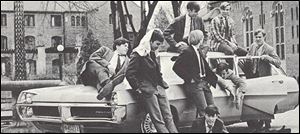
Teasing, pranks, and a certain naive camaraderie were all part of the culture at Cranbrook Schools in the 1960s, the era of this photo, former students say.
The pranksters
He said he didn't remember the victim in the reported incident, John Lauber, and didn't believe his reported homosexuality was the reason for the attack.
Romney classmate Mr. French recalled Mr. Romney as "a very stand-up person."
"We all played pranks on each other, I mean good-natured. I don't remember anything ever being malicious," Mr. French said. He was a day student, but said he and other day students spent plenty of time in the dorms, and he said he never previously heard the Lauber story.
Mary Lou Zieve, a broadcasting personality in Detroit, graduated from Kingswood, the girls' school, 60 years ago. She was friends with Mr. Romney's eldest sister, Lynn.
"As far as what Mitt did, it's entirely possible," Ms. Zieve said. "I can see guys laughing and giggling and doing something stupid. In all fairness if he did I don't think it was done with any violence in mind."
She recalled Mr. Romney's mother, Lenore, and father, George, as kind to her, as a frequent visitor to their home. She said the elder Mr. Romney was friends with her father and believes he helped get her into the school.
"George was a nicer person than what I'm seeing from Mitt," said Ms. Zieve, who has more liberal political views than Mr. Romney currently espouses.
She said he got involved in lots of activities to live up to the reputations of his older siblings.
"There was lots of pressure on him to produce, and to be the hit of the crowd. He was very good-looking. He never had an ugly day," Ms. Zieve said.
"I don't think it reflects on who he is today. I don't really give a crap what he did in high school. I'm more interested in what did he do 10 years ago," she said. "What is he going to do on women's issues, contraception, and what about a woman's right to her body? These are things we want to know. I think he's been a very good husband and father from what I can see, and I think he had a helluva set of parents from whom to learn."
Contact Tom Troy at tomtroy@theblade.com or 419-724-6058.